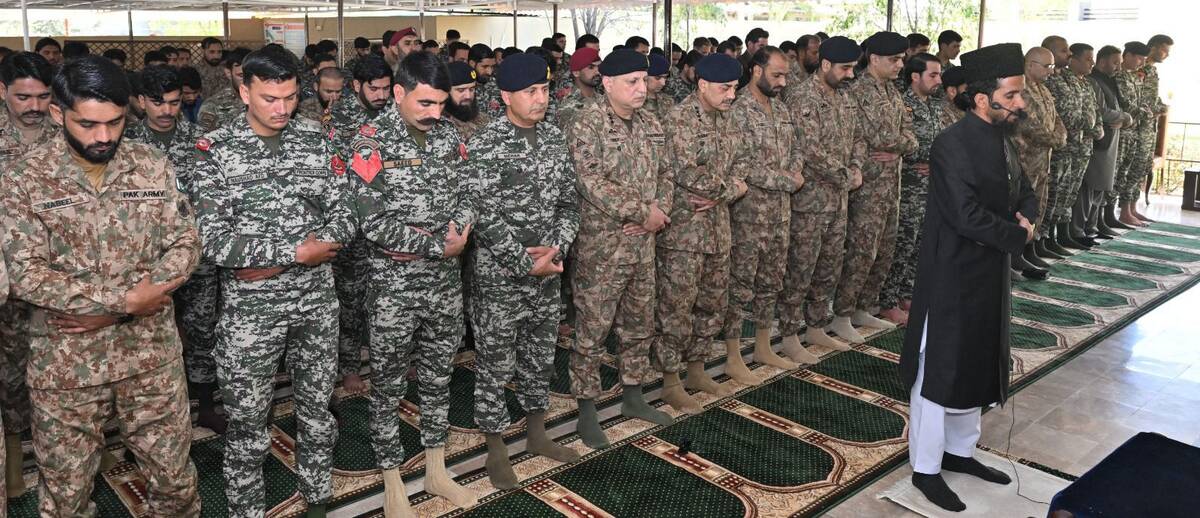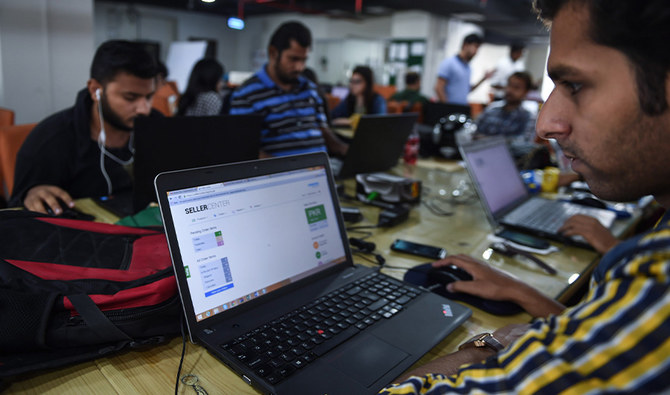PESHAWAR: More than a 100,000 people in Pakistan’s northwestern Khyber Pakhtunkhwa province are believed to have been scammed out of Rs.5.6 billion by an online investment company that investigators failed to crack down on despite early reports of fraud, officials, lawyers and victims of the crime have said.
The company, PSlash, opened an office in Peshawar’s Deans Trade Center in January this year, promising profits of up to 13 percent on investments in real estate and digital and foreign currency. On its last day of operation on November 19, the firm had 105,000 registered investors, a former employee told Arab News.
But on November 20, a notification appeared on the website: “System is hacked.” Since then, victims of the scam say they are unable to reach any of the people who had said they were employed with the company. Many have lost their entire lifesavings.
The loss could have been avoided, lawyers and victims of the fraud say, if investigators and regulators had reacted in time. Indeed, reports of problems with the company were filed months before the company shuttered in November.
Jamal Afridi, an attorney for Yaseen Ullah, one victim of the scam, said he first filed a fraud report with the Federal Investigation Agency (FIA) on August 24 and another one with the Pakistan Telecommunication Authority (PTA) on September 16, saying the agencies “were sleeping when we were knocking at their doors.”
“On behalf of Yaseen Ullah, I met high officials and submitted written complaints to PTA, FIA and police about the suspected fraud company PSlash but no one took it seriously,” the Supreme Court advocate told Arab News.
“If the concerned departments had taken action accordingly, this billions of rupee scam would not have happened in Peshawar,” he added. “Now the government should investigate this issue and punish the concerned officers ... because of their negligence thousands of people lost money.”
Asad Khan, a provincial officer at the FIA, admitted that the online fraud was worth “billions of rupees” but declined to comment when asked why investigators had not acted earlier, despite reports of fraud.
“Right now, we are not in a position to disclose the initial progress [in the case],” he said.
PTA spokesman Khurram Mehrab told Arab News that the regulator started investigating PSlash after receiving a complaint in September, but declined to give more details.
“After receiving the compliant, we started an investigation into this online fraud,” he said. “There are thousands of websites, and until there is a complaint, PTA can’t monitor each and every one.”
It is unclear to date who the owner of PSlash was, but one police report filed in Peshawar names a Rabia Batool. However, neither investors nor former employees of the company that Arab News spoke with have ever met Batool.
Victims said they were in touch with two men called Wasim Zeb and Nabeel Khan who presented themselves as local executives of the company.
“I only knew the local executives and they would tell us that PSlash is a worldwide [company] investing in forex, digital currency and real estate trade,” a former employee told Arab News on condition of anonymity.
He said the company had changed its name three times, from Earn Bitcoin to Payslash and finally to PSlash. When investors questioned its credibility, agents and managerial staff would tell them that it was registered with the Company Security Exchange of Pakistan (CSEP).
A database of companies on CSEP’s website does not include the name of PSlash.
For now, there is no respite for victims of the fraud, many of whom are poor laborers who invested their entire life savings in the scheme.
Muhammad Noor, a daily wage earner, said a friend advised him to borrow money from relatives to invest in PSlash and make a quick profit. He invested Rs2.5 million ($15,625).
“Now I am under an unbearable burden,” he said. “I have already sold my wife’s jewelry.”
Construction contractor Abid Afridi invested Rs500,000 ($3,125) and received one interest payment of Rs10,000 ($62.5) — but only in the first month after the investment.
“It’s very unfortunate and shocking for me and my family that we have lost our savings,” he said. “I am unaware of the legal process and no one knows what to do now.”
Abdur Rehman, who invested Rs1.5 million ($9,375) in the business, said he and several other investors had paid the money to PSlash in person and in cash.
In November, Rehman said, a few of the investors had managed to trace Zeb, the alleged company employee, who had promised to recover their lost funds.
“I am with you and will recover your money soon,” Rehman said, quoting Zeb from the meeting. “But he has since disappeared into thin air.”
Scammers rob Rs5.6 billion in online investment fraud in Pakistan’s northwest
https://arab.news/bdavf
Scammers rob Rs5.6 billion in online investment fraud in Pakistan’s northwest

- PSlash opened an office in Peshawar in January promising profits of up to 13 percent on investments in real estate and digital and foreign currency
- On its last day of operation on November 19, the firm had 105,000 investors, on November 20 a notification on the website read “System is hacked“
Roast chicken made in ‘secret’ 12-spice marinade is Eid hit in northwestern Pakistan

- Customers have been showing up from far and wide to buy Degi Chargha from Rafi Ullah Safi’s shop in Qissa Khwani Bazaar
- Safi’s father concocted the recipe 50 years ago and since then, the marinade has become a local hit, with orders increasing for Eid
PESHAWAR: In the days leading up to the Eid Al-Fitr holiday, Rafi Ullah Safi is especially busy at his shop in Peshawar city’s historic Qissa Khwani Bazaar as customers arrive from across the Khyber Pakhtunkhwa province and beyond to order his Degi Chargha: a steamed chicken roast prepared in a secret marinade of 21 spices.
Safi’s father concocted the recipe over five decades ago and since then, the marination has become the stuff of legend, with orders spiking ahead of Eid and over the three days of the holiday as people buy the roast to serve at home or present as a gift to relatives and friends.
“The night before Eid day, we sit here till morning. There is a rush in the bazaar, people buy dresses and shoes, and some buy sweets and chicken,” Safi told Arab News as he packed an order for a customer.
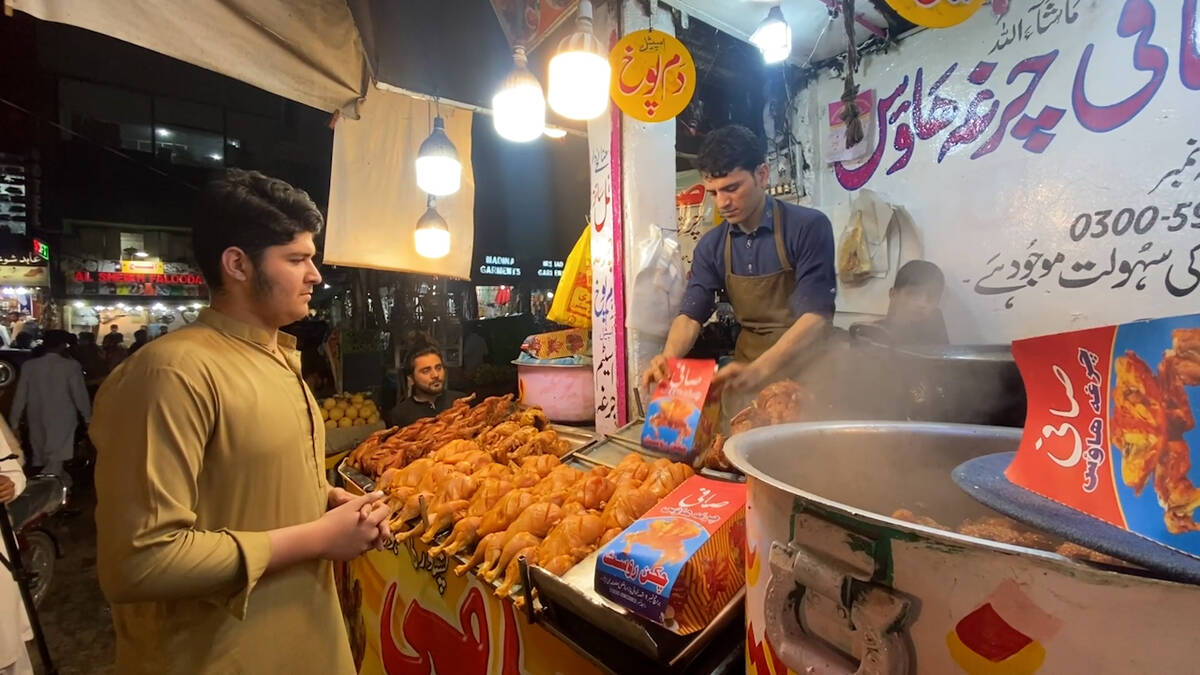
“We offer the morning prayer here [in Qissa Khwani Bazaar] and then go home. Then we offer the Eid congregation [the next morning] and people start calling us soon after to come to the shop to serve them Degi Chargha even on Eid day.”
Despite the roast’s popularity, the exact spices that go into the mix are only known to the family.
“All the ingredients are kept secret,” Safi said. “My father started the business and my elder brothers handled it when I was young. Then I joined in, and now my children are also working here.”
He said the recipe, passed down from his father to elder brothers and now him, was being learnt by his children.
“First, we take yoghurt and blend it properly, after which we put the 21 spices mix, ketchup, lemon and other things,” Safi said. “We also add some of the spices bought from the bazaar, which make our special mixture of spices stronger and sourer.”
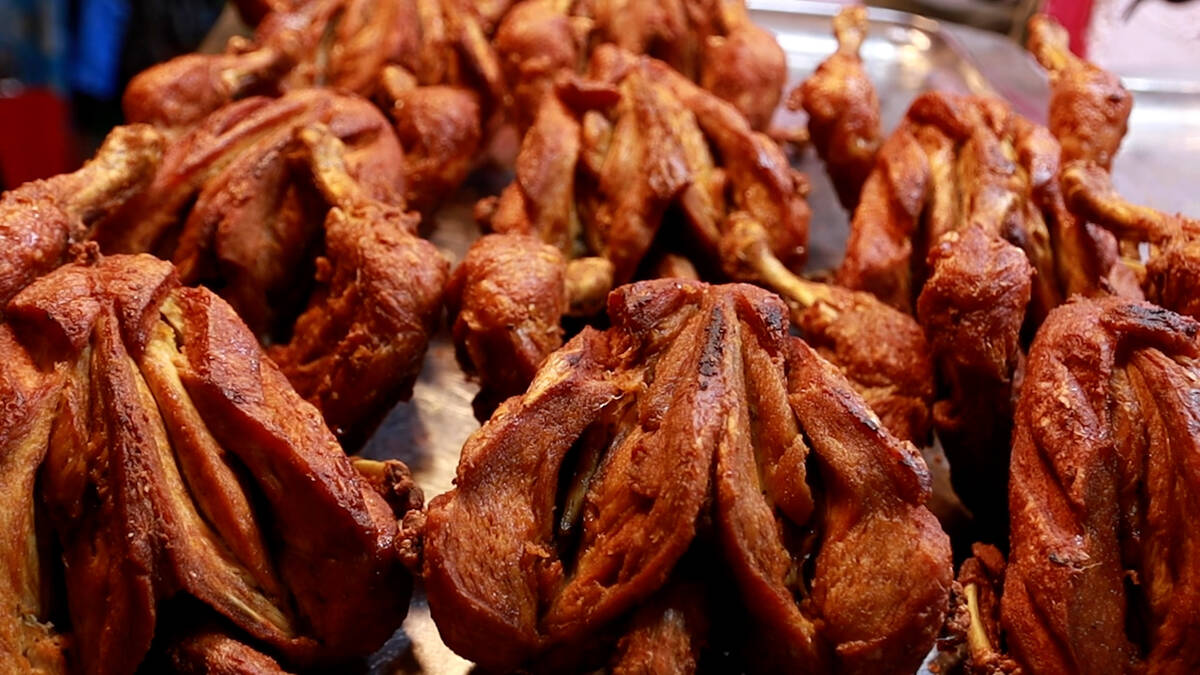
The spices are mixed in the yogurt with an electric churner for almost half an hour until the color changes to red, Safi explained. The mixture is prepared at his home early every morning before being brought to the shop.
The chicken meanwhile is deep fried in oil and then cooled for 30 minutes before being soaked in the spice and yogurt marinade.
“The chicken is dipped in the special spices and then placed in the steam pot, which is placed over boiling water for 20-30 minutes. Then the Degi Chargha is ready,” said Safi.
One full chicken retails for around $5 a piece.
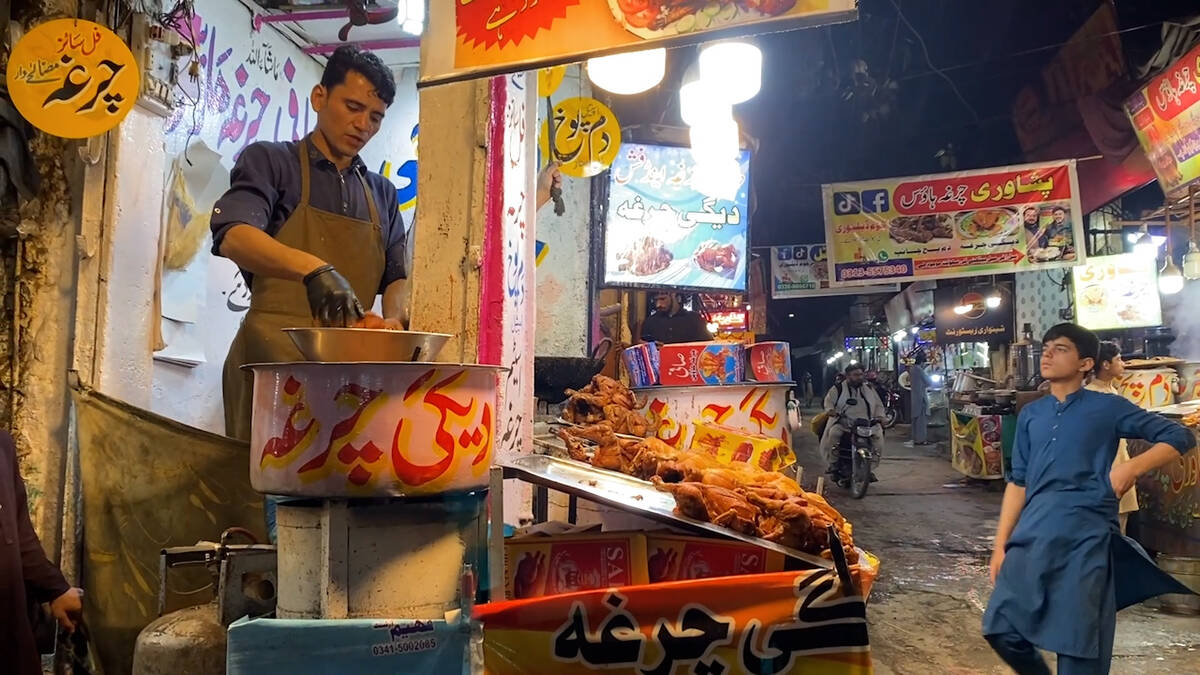
“The price is higher than usual roasts because of the specialty and uniqueness of the chicken,” Safi said.
Hammad Khan, a 22-year-old customer, said social media viral videos had increased the popularity of the Degi Chargha.
“Many food vloggers have made videos motivating others to come and taste it. That’s why I have come here to buy and check the taste of this chicken,” he said.
Another customer Hamza Khan, a resident of Peshawar’s Saddar Bazaar, also said he had discovered Degi Chargha through TikTok.
“I saw a video of this shop so we thought to go and give it a try,” he said. “The specialty was the spices added to the chicken. It enhances the taste. My experience was good.”
Faith in every shell: Karachi’s Hindu artisan honors Islamic art through seashell creations

- Babu Lal, 64, picks seashells and inscribes them with sacred Islamic names and verses
- Nearly 300 Hindu families in Karachi have kept seashell art tradition alive since before 1947
KARACHI: In a modest home situated in one of the narrow streets of a portside slum in the Pakistani megacity of Karachi, a 64-year-old artisan gently picked up a seashell, wiped it clean and began to inscribe it in ink with the names of Allah and the Prophet Muhammad (peace be upon him).
With careful strokes, he transformed the shell into a delicate showpiece, destined for display in upscale shops in Clifton and, eventually, homes across Pakistan. The piece is special, and so is the maker: Babu Lal, a Hindu by faith.
Hindus make up 2.14 percent of Pakistan’s population, according to the 2017 census, with a majority of them living in the southern Sindh province, of which Karachi is the capital. In many areas of Sindh, Hindus and Muslims have historically coexisted, though reports of discrimination and violence, such as forced conversions of Hindu girls, blasphemy accusations and land grabs, have increased in recent decades, drawing concern from human rights groups.
And yet, in Karachi’s coastal area of Ibrahim Haideri — along with parts of the Qur'angi and Clifton neighborhoods — nearly 300 Hindu families have kept this seashell art tradition alive, passing it down through generations since well before the country’s independence in 1947.
“Our art teaches respect for all religions, and we work for all religions,” Lal told Arab News, his weathered hands working on a shell.
“We first bring shells from the sea, then clean and wash them, and after that, we make art products from them and supply them to the market,” he said. “All the hard work and labor in this process is done by hand. There is no machine work involved.”
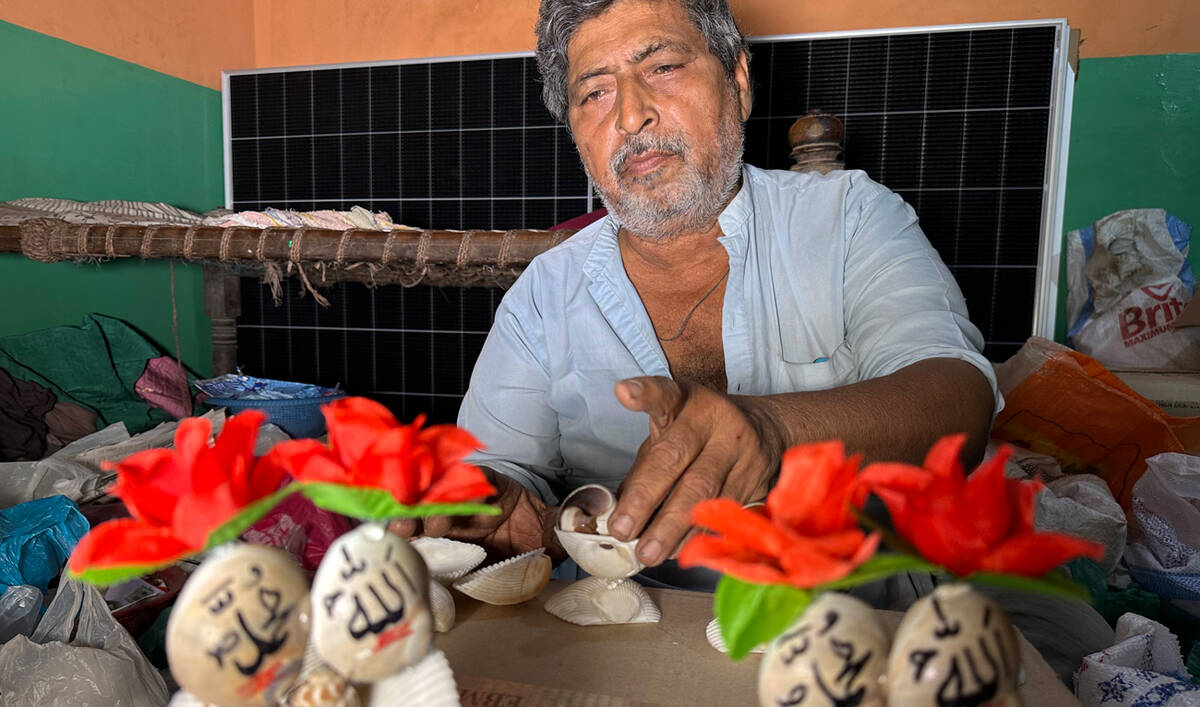
Lal’s creations include a wide range of items from keychains and glass ornaments to frames bearing sacred names and miniature replicas of the Holy Kaaba, among the most sought-after items in the market.
“While making these items, we take extra care in cleaning and handling them,” he said. “We do all this work quite carefully.”
UNCERTAIN FUTURE
Lal’s journey as an artisan began in childhood when he learned the trade by watching his father and grandfather at work over half a century ago.
But the future of the craft is now uncertain, due to a lack of institutional support and limited opportunities for artisans like himself. This has discouraged him from passing the craft on to his children.
Another problem, according to Lal, was that stalls set up by local artisans were now frequently dismantled and once busy sales spots for artists, including popular areas along the Clifton seafront and Manora, had been closed off in recent years.
“They no longer allow us to set up stalls there so what can we do?” the artist asked. “That’s why we want to stop this work. If you’ve seen the stalls at Clifton’s Sea View, those have also been shut down.”
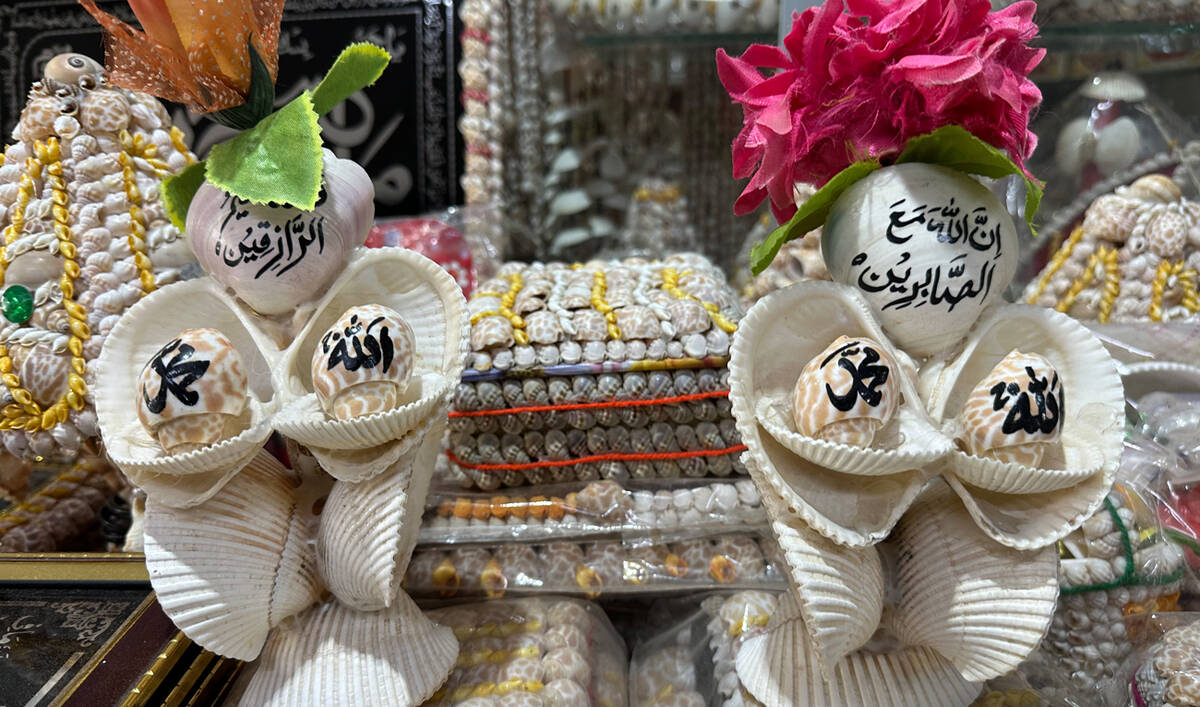
Despite these challenges, shopkeepers like Gul Sher Abbasi acknowledge Lal’s dedication and craftsmanship.
“These items mostly come from Babu,” Abbasi told Arab News. “Then, there are different people who manufacture and we get them as well.”
“Handcrafted items are something different,” he added. “The things that are made by hand are special. There is a different pleasure in preparing those things.”
Abbasi said the seashells’ craft held potential beyond Pakistan’s borders and with the right support, Lal’s handmade items could find buyers in Gulf countries like Saudi Arabia, the United Arab Emirates and Qatar.
Meanwhile, Lal said his art extended across religious lines, with orders coming in for Christian, Hindu and Muslim communities alike.
“We work for everyone, and we also make things based on specific orders,” he said. “If someone orders us to make an idol, we make it. If someone orders a cross, we make it.”
Pakistan PM extends greetings to UAE and Iranian leaders on Eid Al-Fitr

- Shehbaz Sharif acknowledges UAE’s longstanding support to Pakistan, seek stronger economic ties
- The prime minister also calls for closer cooperation with Iran to deal with border security challenges
ISLAMABAD: Prime Minister Shehbaz Sharif reached out to the leaders of the United Arab Emirates and Iran to extend Eid Al-Fitr greetings on Monday, highlighting Pakistan’s close ties with the two countries and calling for continued collaboration in areas of mutual interest.
Sharif has contacted the top leadership of several Muslim-majority nations since the end of Ramadan, including Gulf states, Malaysia and Bangladesh, in a diplomatic outreach that coincides with Pakistan’s efforts to attract foreign investment to bolster its struggling economy.
According to the Prime Minister’s Office, Sharif held “a warm and cordial telephone conversation” with UAE President Sheikh Mohamed bin Zayed Al Nahyan.
“The Prime Minister fondly recalled his recent meeting with the UAE President in Abu Dhabi last month and reaffirmed his strong resolve to transform the existing Pakistan-U.A.E. ties into a mutually beneficial economic partnership,” his office said in a statement. “He also expressed Pakistan’s deep appreciation for U.A.E.’s longstanding and steadfast support to Pakistan.”
The UAE president reciprocated the Eid greetings and reiterated his country’s “unwavering support for Pakistan’s economic and development initiatives,” while stressing the importance of continued collaboration across various fields.
Sharif also spoke with Iranian President Masoud Pezeshkian and extended Eid greetings to Iran’s Supreme Leader Ali Khamenei and its people.
“The Prime Minister said that Pakistan and Iran enjoyed deep fraternal relations and, as neighboring countries, they could benefit from enhanced trade,” a separate statement said. “At the same time, they also needed to cooperate more closely to deal with challenges such as border security.”
The Pakistan-Iran border has long been a source of concern, with both sides grappling with smuggling networks, cross-border militant activity and recent flare-ups in tensions involving missile and drone attacks last year.
Pakistan saw highest number of militant attacks during Ramadan in a decade

- The Pak Institute for Peace Studies reported at least 84 attacks during Ramadan, which ended Sunday in Pakistan
- Some militant groups previously paused hostilities for Ramadan, but overall violence has increased in recent years
ISLAMABAD: Pakistan saw the highest number of militant attacks during the Muslim holy month of Ramadan in a decade, a think tank reported Monday.
Some militant groups previously paused hostilities for Ramadan, but the country has seen an overall increase in violence in recent years.
The Pak Institute for Peace Studies reported at least 84 attacks during Ramadan, which ended Sunday in Pakistan. It reported 26 attacks during last year’s Ramadan.
The Pakistani Taliban unilaterally ended a ceasefire with the government in November 2022, while the Baloch Liberation Army has developed its capabilities to stage elaborate attacks. Both have contributed to the rise in violence.
The outlawed BLA was behind a train hijacking on March 11 in the southwest province of Balochistan that killed at least 25 people.
Another think tank, the Pakistan Institute for Conflict and Security Studies, recorded 61 attacks in the first three weeks of Ramadan. There were 60 total attacks in the previous Ramadan, it said.
It also said this was the deadliest Ramadan in a decade for security personnel, with 56 killed between March 2 and March 20.
Abdullah Khan, managing director of the Pakistan Institute for Conflict and Security Studies, cited an overall escalation in militant activity.
“There has been a unification of different groups,” Khan said. “Baloch factions are joining hands. In some areas (of the northwest), the Hafiz Gul Bahadur faction is more lethal than the Pakistani Taliban, it is competing with them.”
He said there was also a revival of banned organizations like Lashkar-e-Islam, which operates from the northwest province of Khyber Pakhtunkhwa.
Pakistan accuses the Taliban government in neighboring Afghanistan of giving haven to such groups, saying militants have thrived since the Taliban returned to power in 2021. Kabul rejects that.
Khan also pointed to intelligence failures, including those that led to the train hijack in Balochistan, and the widening trust gap between the state and the population: “It’s important to get back public support. The public is the first line of defense.”
Pakistan army chief spends Eid with troops on Afghan border amid surge in militancy

- Pakistan ranks as the second-most affected country by terrorism, according to The Global Terrorism Index 2025
- Islamabad has blamed the surge on militant groups operating out of Afghanistan, an allegation denied by Kabul
ISLAMABAD: Pakistan’s Army Chief General Asim Munir on Monday visited the northwestern Khyber Pakhtunkhwa (KP) province, where he spent the first day of Eid Al-Fitr with officers and troops deployed along Pakistan’s border with Afghanistan, the Pakistani military said.
Gen. Munir visit comes at a time when Pakistan security forces have been fighting a surge in militant attacks in the country’s western provinces of KP and Balochistan.
Pakistan is battling twin insurgencies: one led by religiously motivated groups, mainly the Tehreek-e-Taliban Pakistan (TTP), in KP and the other by ethno-nationalist Baloch separatists in Balochistan.
During his visit to KP’s South Waziristan and Dera Ismail Khan districts, the army chief extended Eid greetings to the troops and lauded their “unwavering dedication and exemplary service to the nation.”
“Your commitment and resilience not only secure our homeland but also exemplify your profound love for Pakistan,” he was quoted as saying by the Inter-Services Public Relations (ISPR), the Pakistani military’s media wing.
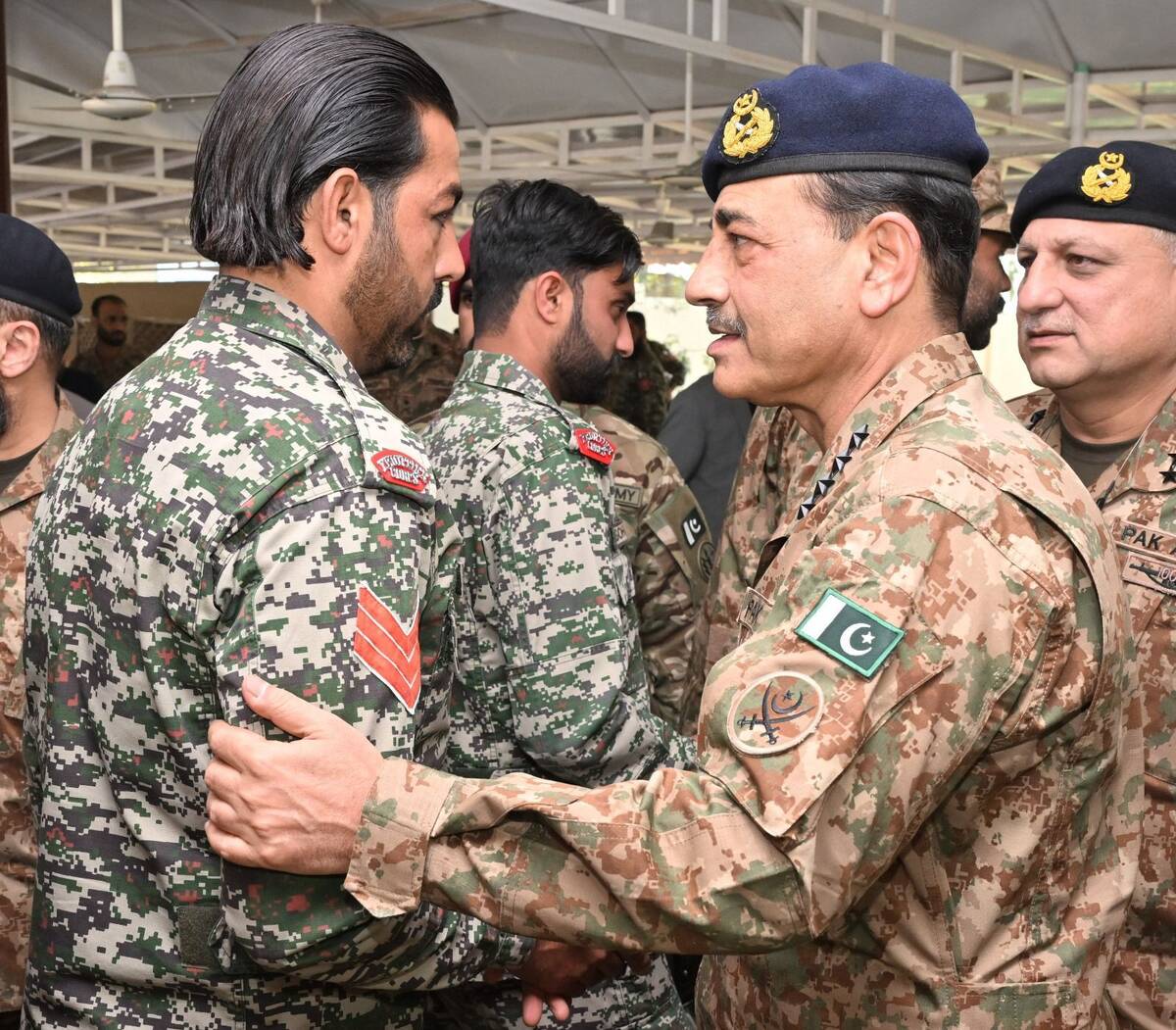
Pakistan ranks as the second-most affected country by terrorism, according to The Global Terrorism Index 2025. Militancy-related deaths surged by 45 percent, rising from 748 in 2023 to 1,081 in 2024, marking one of the steepest global increases.
At least 1,141 Pakistanis were killed or injured from Jan. 1 till Mar. 16 in “terrorism” incidents, Minister of State for Interior Tallal Chaudry said this month.
Islamabad has frequently accused neighboring Afghanistan of sheltering and supporting militant groups that launch cross-border attacks in Pakistan’s western regions. Afghan officials deny involvement, insisting Pakistan’s security issues are an internal matter of Islamabad.
Speaking with officers and troops deployed on the border, the army chief lauded the morale of the armed forces, law enforcement agencies (LEAs) and the people of Khyber Pakhtunkhwa for braving the “menace of terrorism,” according to the ISPR.
“The COAS (chief of army staff) attributed their achievements to the sacrifices of our martyrs and those who are committed toward the greater cause of peace and stability,” it added.
